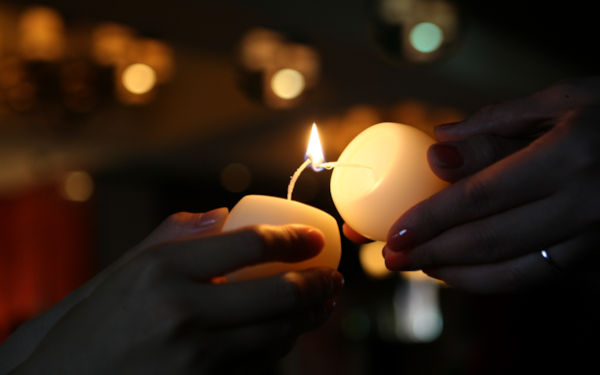The Rev. John Boley reflects on the depth of grace symbolized in the lighting of the Advent Candles.
REV. JOHN BOLEY
Clergy Assistant to the Bishop
 This past Sunday when Diane and I were in worship, we sang that great Advent Hymn, “Hail to the Lord’s Anointed.” I was struck by the third verse:
This past Sunday when Diane and I were in worship, we sang that great Advent Hymn, “Hail to the Lord’s Anointed.” I was struck by the third verse:
He shall come down like showers upon the fruitful earth;
love, joy, and hope, like flowers, spring in his path to birth.
Before him, on the mountains, shall peace, the herald, go,
and righteousness, in fountains, from hill to valley flow.
As I sang this verse of this great hymn, its recitation of Hope, Peace, Joy and Love struck a chord, reminding me of the countless times I have participated in the lighting of Advent Candles over the years. Lighting Advent candles every year is a tradition that speaks volumes to so many people, and is so easily captured by children as they grow in faith.
But the common use of “Hope,” “Peace,” “Joy” and “Love” makes these terms almost too familiar, almost too rote, almost too trite, almost too pedestrian. Like the Lord’s Prayer, we often use these terms, in Advent and of course at other times, without internalizing how radical they are, and how filled they are with inexplicable grace.
For me, to fill these terms with grace-full meaning, I must compare them to their counterparts which are based on the circumstances and happenings of our lives.
- Hope v. Optimism. Optimism is based on an assessment of current circumstances pointing to the future that looks bright and positive. Hope is very different from this. It is based in confidence in God’s activity in the world. Hope can exist in the bleakest of circumstances. As Leon Joseph Suenens puts it, “I am a man of hope, not for human reasons, nor from any natural optimism, but because I believe the Holy Spirit is at work in the Church and in the world even when his name remains unheard.” Optimism is good, but Hope is grace-full.
- Peace v. Contentment. Contentment is based on life circumstances and connotes satisfaction and happy acceptance of positive things that are happening. Peace (individual peace) is very different from this. Real Peace is something which “passes all understanding” (Philippians 4) and can only come from the power of the Triune God, not as the world gives. (John 14). Billy Graham once said, “I would not change places with the wealthiest and most influential person in the world. I would rather be a child of the King, a joint-heir with Christ, a member of the Royal Family of heaven! I know where I’ve come from, I know why I’m here, I know where I’m going – and I have peace in my heart. His peace floods my heart and overwhelms my soul!” Contentment is good, but Peace is grace-full.
- Joy v. Happiness. Happiness is the emotional and mental state of a person based on circumstances that affect that person’s short-term well being. It can rise and fall based on the changes in those circumstances. But joy is very different from this.It is not based in circumstances, but is based in the delight of the Holy Spirit. Charles Hembree says, “Joy is like a well containing sweet water. It is not enough to know the water is there or even to drill the well. If the well is to be useful, the water must be brought to the surface. Those who know Christ have found the source of joy.” Happiness is good, but Joy is grace-full.
- Love v. Affection. Affection is the state of endearment and attraction that comes from a very positive relationship. It can be emotional, physical, and intellectual. We all thrive on affection as we are all social and relational beings. But love is very different from this. Martin Luther King, Jr. talked about the three levels of love – love of self, love of neighbor and love of God. Oswald Chambers says, “If human love does not carry someone beyond himself, it is not true love. If love is always discreet, always wise, always sensible and calculating, never carried beyond itself, it is not love at all. It may be affection, it may be warmth of feeling, but it has not the true nature of love in it.” Beyond our joy and obligation to love (love of enemies is of course the toughest), love only exists at all because it is the character of God, who first loves all of creation and has made us in God’s image. Affection is good, but Love is grace-full.
Maybe it’s because I’ve been doing this for a long time, or because the state of our world seems to be bringing more difficult circumstances, but I am more thrilled than ever that Hope, Peace, Joy, and Love are not dependent on life’s circumstances, but rather on the powerful workings of the Creator, the Christ, and the Spirit in our lives. Thanks be to God.
Last Updated on January 4, 2018

